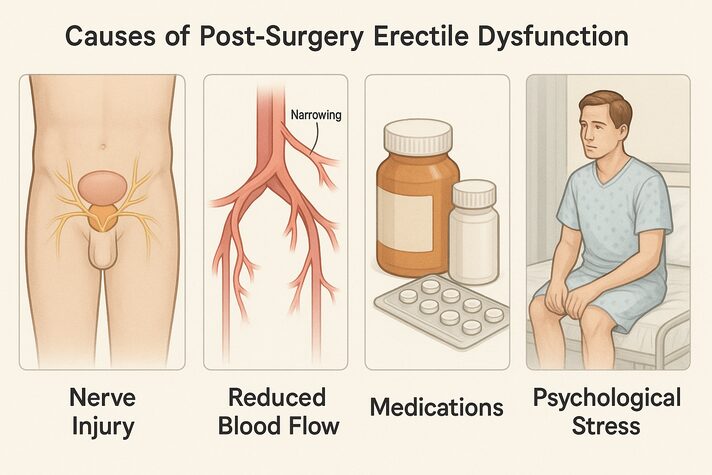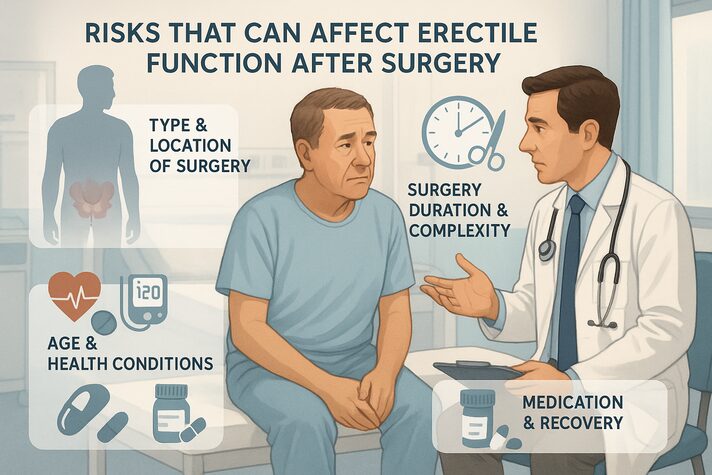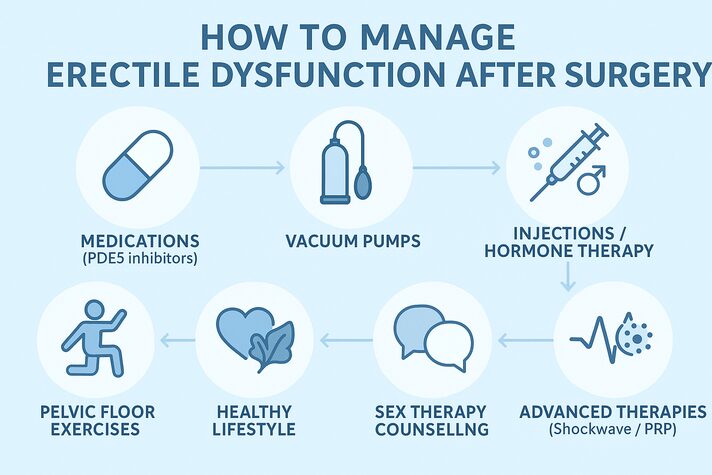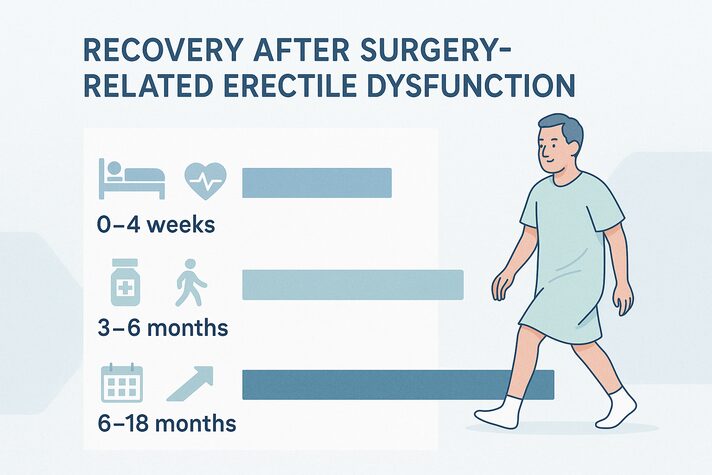Erectile Dysfunction After Surgery: Risks And Recovery
Written by Dr. Ritu Koul
Dr. Ritu Koul is a medical professional and author specializing in sexual wellness. Through her writing, she focuses on evidence-based education, compassionate care, and breaking long-standing taboos around sexual health, intimacy, and relationships. Her work aims to empower readers with accurate information to make informed decisions about their well-being.
•
November 14, 2025
Our experts continually monitor the health and wellness space, and we update our articles when new information becomes available.

Quick Read
Erectile dysfunction after surgery is common and often temporary. It usually happens because of nerve irritation, reduced blood flow, or hormonal and emotional changes during recovery. Most men regain normal function with time, proper care, and treatments such as medications like Viagra or Cialis, exercise, therapy, and healthy habits. The key is to stay patient, follow your doctor’s advice, and seek help early if problems persist.
Erectile dysfunction post-surgery can come as a surprise, especially if no one prepared you for it**.** Many men notice changes in their erections after procedures involving the prostate, thyroid, pelvis, or even major blood vessels. And when something as personal as sexual function shifts so suddenly, it’s natural to feel worried or confused about what’s happening. Men searching for erectile dysfunction after surgery often want to understand why it is happening, whether it is normal, and how long recovery might take. You may be wondering if these changes are temporary, if the surgery caused the problem, or whether treatment can help you return to your normal sexual health. In this article, we will explain whether surgery causes erectile dysfunction, which surgeries can affect erections, how surgery impacts nerves and blood flow, what increases the risk of erectile dysfunction, and the treatments that can support recovery. You’ll also learn when to see a doctor and what to expect during the healing process.
Does Surgery Cause Erectile Dysfunction?
Yes, certain types of surgeries may cause erectile dysfunction. Surgery, especially in areas near the pelvis, spine, or major blood vessels, can affect the nerves and blood flow that are responsible for erections. A study found that erectile dysfunction was most common after thyroid surgery, especially complete removal of the thyroid (total thyroidectomy), where about 60% of patients reported erectile dysfunction within six months.[1]
Which Surgeries Can Cause Erectile Dysfunction?
Some types of surgeries may affect the nerves, blood vessels, or tissues involved in erections. The most common ones are:
1. Prostate or Bladder Surgery
Procedures such as removing the prostate completely (radical prostatectomy) or surgeries that try to protect the nearby nerves (nerve-sparing radical prostatectomy) are usually done to treat prostate or bladder cancer. These operations are also known to cause erectile dysfunction after surgery because the nerves that control erections sit very close to the prostate and bladder. During surgery, these nerves can be stretched, bruised, or injured, which can make it harder to get or maintain an erection.[2]
2. Radiation Therapy
Sometimes, radiation therapy used to treat cancer in the pelvic area or bladder can lead to erectile dysfunction over time. This happens because the radiation in that region can slowly damage the small blood vessels that supply the penis. When these vessels are affected, blood flow decreases, and the penile tissue can become less flexible. These changes can make erections more difficult and may slow down the overall recovery of erectile function.[2]
3. Hernia Repair
A hernia itself usually does not affect a man’s sexual function because it does not involve the sexual organs or the nerves that support erections. However, some men may experience temporary sexual difficulties after undergoing hernia repair surgery.[3]
How Can Surgery Cause Erectile Dysfunction?
Surgery puts both mind and body under stress. While most procedures are safe, some can temporarily affect the nerves or blood flow that are responsible for healthy erections. Understanding these causes can help you recover faster.
1. Nerve Injury
The most common cause of erectile dysfunction after surgery is injury to the nerves (called cavernous nerves) that control erections. These nerves sit very close to the prostate and can be stretched, bruised, or temporarily damaged during surgery. When this happens, the signals that travel between the brain and the penis are interrupted, making it harder to get or maintain an erection.[4]
2. Effect on Blood Flow
Erections depend on good blood flow. Certain surgeries, such as open aortoiliac surgery (a type of vascular surgery), can affect how blood flows to the penis. Sexual dysfunction is a common complication after open aortoiliac surgery.[5]
3. Medication Side-Effects
Some post-surgery medications, such as certain blood pressure drugs or antidepressants, may cause erectile dysfunction as a side effect.[6]
4. Psychological Factors
Mental and emotional health also play an important role in erections. After surgery, it is normal to feel anxious about healing or sexual performance. This worry can make it harder to relax and feel aroused. For most men, this is temporary and improves as confidence returns and the body continues to recover.

What Increases Erectile Dysfunction Risk After Surgery?
While most surgical procedures are safe, some carry a high chance of temporarily affecting sexual health. The risk of erectile dysfunction after surgery depends on where the operation is done, how serious it is, and your overall health before the procedure. Understanding these risks can set realistic expectations.
1. Type and Location of Surgery
Surgeries involving the pelvic area, prostate, bladder, or major blood vessels carry the highest risk because the nerves and arteries that control erections are located very close to these structures. Even small changes or irritation in these areas can affect how erections work.
2. Duration and Surgery Difficulty
Long or complicated surgeries can put extra strain on the body and slow blood flow for a while. This may reduce oxygen to the penile tissue and cause temporary erection changes.
3. Existing Health Issues
Men with health conditions such as diabetes, high blood pressure, and obesity have a higher risk of erectile dysfunction. These conditions can make it difficult for the body to recover after surgery.[6]
4. Recovery Complications
Problems such as infection, swelling, or the development of scar tissue can also slow down the recovery process and delay the return of normal erectile function.

When to See a Doctor
Mild erectile dysfunction after surgery is temporary and normal. Consult a doctor for erectile dysfunction post-surgery:
- If erectile dysfunction lasts beyond six months.
- If you notice continuous pain and swelling in the pelvic or groin area.
- If it starts affecting your mood, sexual desire, and relationship.
“It’s normal to feel anxious about erection changes after surgery, but in most cases, it’s only temporary. As your body heals and nerves recover, things usually improve with time and the right care.”
How To Manage Erectile Dysfunction Caused By Surgery?
Erectile dysfunction after surgery is usually treatable, and most people recover over time. Treatment depends upon what caused it, whether it’s a nerve injury, psychological stress, or poor blood flow. Let's explore the treatment options:
Medical Treatment
1. Phosphodiesterase 5 Inhibitors (PDE 5)
Drugs like sildenafil (viagra), tadalafil (Cialis), work by relaxing the blood vessels in the penis. This improves the blood flow and makes it easier to achieve and maintain erections.
2. Vacuum Erection Devices
Vacuum pumps are erection devices that create suction around the penis to draw blood into the erectile tissue. It is useful for men who have erectile dysfunction due to nerve damage from radical prostatectomy or spinal cord injury.
3. Penile Injections
Penile injections are for people who do not respond to oral medication/tablets. It helps relax the blood vessels in the penis, allowing an erection to happen within 10-15 minutes.
4. Shockwave Therapy
Low-intensity shockwave therapy can help repair and strengthen the blood vessels in the penis. By improving blood flow, it becomes easier to achieve and maintain a firmer erection.
Supportive Therapies
1. Pelvic Floor Exercises (Kegels)
Kegels help in strengthening the pelvic muscles that control erections and ejaculation. It helps to improve blood flow, control erections, and ejaculation. They are a simple and effective way to recover faster after pelvic or prostate cancer surgery
2. Lifestyle Changes
Healthy lifestyle changes like walking, quitting smoking, and proper sleep help in managing stress and hormonal imbalance.
3. Sex Therapy or Counselling
After surgery, men feel worried about the changes in their bodies and performance. Sex therapy and counselling can help in resolving these issues, reduce anxiety, and build confidence.

Recovery After Surgery: What to Expect
Recovering from erectile dysfunction after surgery takes time, but most men regain normal function with the right treatment and patience. The recovery timeline varies based on the type of surgery you had and how much the nerves or blood vessels were affected.
- First few weeks: Erections may be weak or may not happen at all, which is normal. The focus during this period should be on rest, gentle movement, and following your doctor’s recovery instructions.
- 3–6 months: Many men start to notice a gradual improvement. Medicines like Viagra or devices such as vacuum pumps can help increase blood flow and support the healing process.
- 6–18 months: Nerves continue to heal during this period. Staying consistent with treatment, doing pelvic floor exercises, and maintaining healthy habits can lead to better results.
Overall, patient satisfaction is significantly improved when erectile recovery is supported with early diagnosis and consistent follow-up.

Conclusion
Erectile dysfunction after surgery is most often a temporary and treatable side effect. With the right medical care and patience, many people regain normal sexual function. Getting support early can make the recovery process smoother and improve your results. If erectile dysfunction continues, it’s important to speak with a qualified sexual health expert. Early guidance can help you recover more comfortably, rebuild confidence, and protect your overall sexual well-being.
Disclaimer
The following blog article provides general information and insights on various topics. However, it is important to note that the information presented is not intended as professional advice in any specific field or area. The content of this blog is for general educational and informational purposes only. The content should not be interpreted as endorsement, recommendation, or guarantee of any product, service, or information mentioned. Readers are solely responsible for the decisions and actions they take based on the information provided in this blog. It is essential to exercise individual judgment, critical thinking, and personal responsibility when applying or implementing any information or suggestions discussed in the blog.
Most Asked Questions
Is erectile dysfunction after surgery permanent?
In most cases, no. Erectile dysfunction after surgery is usually temporary and improves as nerves and blood vessels heal. Recovery time varies — some men notice progress within a few weeks, while others take several months. With early medical guidance, most men regain normal erectile function.
What types of surgeries are most likely to cause erectile dysfunction?
ED is more common after surgeries that involve the pelvis, prostate, bladder, spine, or major blood vessels, since these areas are close to the nerves and arteries responsible for erections. Prostate surgery, hernia repair, and spinal operations are the most frequently linked.
How long does erectile dysfunction last after surgery?
It depends on the type of surgery and how well the body heals. For many men, erections return within 3 to 12 months. Nerve-related surgeries may take longer, sometimes up to 18 months. Following your doctor’s recovery plan, doing pelvic exercises, and staying healthy can help speed things up.
How can I treat erectile dysfunction after surgery?
Treatment usually starts with oral medications like Viagra or Cialis. If these don’t work, doctors may suggest vacuum devices, injections, hormone therapy, or advanced options such as shockwave or PRP therapy. Combining these with lifestyle changes and pelvic floor exercises gives the best results.
When should I see a doctor about post-surgery ED?
You should seek medical advice if erections haven’t improved after six months, or if you experience pain, swelling, numbness, or emotional distress. Early consultation helps identify the cause and begin the right treatment, improving both physical and emotional recovery.
Sources
- 1.
Thyroidectomy, especially total thyroidectomy, adversely affects erectile function in men
- 2.
Erectile dysfunction after surgical treatment
- 3.
Can an inguinal hernia affect a man’s sexual function?
- 4.
Molecular pathogenesis and treatment of cavernous nerve injury-induced erectile dysfunction: A narrative review
- 5.
Sexual Dysfunction Following Aortoiliac Surgery Does Endovascular Repair Preserve eRectile Function??
- 6.
Erectile Dysfunction


